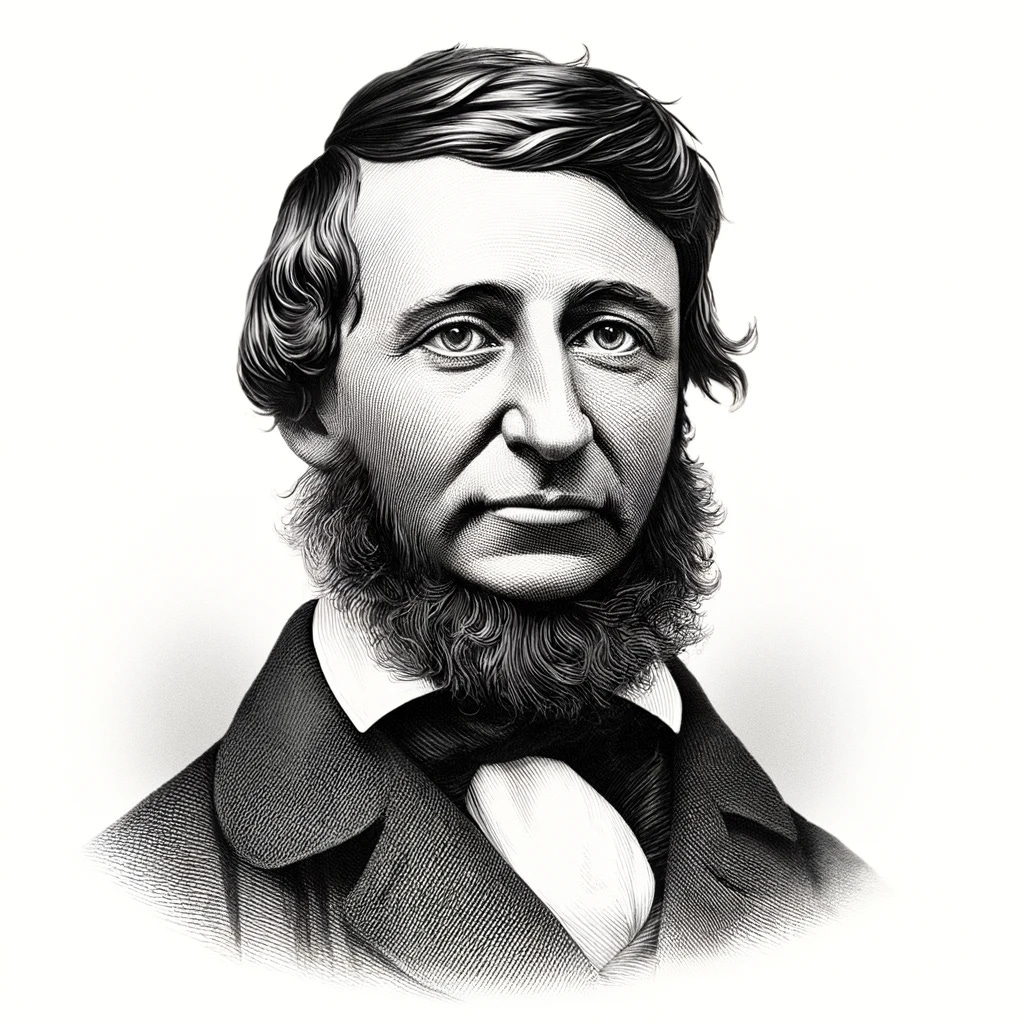Hi all,
Welcome to another edition of Sweet Bites, Mind Candy’s bite-sized newsletter with thought-provoking finds to send you into the weekend with.
This week we kicked off our April theme of exploring emotions with a dive into the emotion of grief (link below).
Support my work and upgrade to a paid subscription below.
Any of the below bites resonate? Hit the reply button and let me know.
📖 Story
Thoreau's Travels Through Grief
Perhaps one of the hardest times in the life of the author Henry David Thoreau came at the beginning of 1842. On January 1, Thoreau’s older brother John cut his left ring finger while shaving. Within 11 days, he would die from a tetanus infection at the age of 27.
Thoreau was completely devastated by the loss.
He would seek out his good friend Ralph Waldo Emerson as a way of coping. Walking in 32 degree snowy weather, Thoreau made the trek to Emerson’s home where he would stay until he could recover from his grief.
In the grips of grief, Thoreau would describe it as being much like a “feather floating in the atmosphere, on every side is depth unfathomable.”
But before January was up, tragedy would strike again, this time in the form of Emerson’s own five-year old son Waldo. Contracting scarlet fever, the little boy succumbed to the disease in the evening of January 27th.
With the loss of both his brother and friend’s son, Thoreau’s grief deepened. In the midst of his own grief, Emerson would give Thoreau a copy of Guillaume Oegger’s The True Messiah. According to Thoreau and Emerson biographer Robert Richardson, Oegger “believed everything in nature stands for something in mind, the entire physical world then functions as a visible language, a collection of emblems we can decipher.”
This would be the first step in Thoreau’s journey of recovery from grief.
The book would be the catalyst for Thoreau’s reconnection with nature, something he had always been close to. Through Oegger’s work, Thoreau would begin to see his small part in the larger picture of nature.
“There seem to be two sides to this world presented us at different times— as we see things in growth or dissolution—in life or death—For seen with the eye of a poet—as God sees them, all are alive and beautiful, but seen with the historical eye, or the eye of the memory, they are dead and offensive. If we see nature as pausing, immediately all mortifies and decays—but seen as progressing she is beautiful.”
The Stoics, pulling from the early Greek philosophers, believed in the continuous notion of Nature, the ebbs and flows, the births and deaths. “To decompose is to be recompose,” Marcus Aurelius would write to himself in The Meditations. “That's what nature does. Nature - through whom all things happen as they should, and have happened forever in just the same way, and will continue to, one way or another, endlessly.”
Robertson would note that while these deaths of John and Waldo rocked Thoreau from his life, they also brought forth a greater appreciation and connection to it.
“How plain that death is only the phenomenon of the individual or class. Nature does not recognize it. She finds her own again under new forms without loss. Yet death is beautiful when seen to be a law, and not an accident—It is as common as life...”
It is through this epiphany, through the connectedness of nature, the circle of life, that Thoreau was able take his first steps out from grief’s shadow. He would go on to write to a friend:
"My destiny is now arrived —is now arriving. I believe that what I call my circumstances will be a very true history of myself."
Robertson would summarize three key features that assisted Thoreau on his journey through grief:
The realization that our friendships are just as important as our family
His “emotional acceptance” to nature and life, and understanding death’s part in it all
An “anti-anthropomorphic, nature-centered” approach to life
There is ultimately no way around grief. There is no side-stepping it, no avoiding it, it is too much a part of each of us. It is our connection to one another, to life itself. “Resilience comes from deep within us and from support outside us,” wrote Sheryl Sandberg, “...It comes from analyzing how we process grief and from simply accepting that grief.”
When we learn to accept it, when we learn to accept the ephemeral nature of life, we not only turn to stare grief in the face, we take our first step in overcoming that grief, in wrangling it back within our control.
Perhaps much of Thoreau’s belief can be summarized within Marcus Aurelius’ own reminder to himself:
“You have functioned as a part of something; you will vanish into what produced you. Or be restored, rather.”
📖 Book Recommendation
A Grief Observed by C.S. Lewis
A short reflection on his journey through grief following the death of his wife, C.S. Lewis outlines in some of the clearest ways what it means to grieve, and how one can find a way through it.
“Grief is like a long valley, a winding valley where any bend may reveal a totally new landscape.”
✏️ This Week’s Wednesday Wisdom
As a reminder, I have been posting Wednesday Wisdom’s via Substack Notes for our trial this month.
You can download the app below if interested and follow all the Notes I post.
📰 Article Recommendations
This week two articles stood out to me on grief. While grief is a universal emotion, it is felt differently and impacts each of us in its own way.
Article: The Fog of Grief by April Reese
Summary: The article explores how grief impacts not just our emotions but our entire being.
“Grief has such a powerful effect on us, I learned, that it rewires the brain: the limbic system, a primal part of the brain controlling emotions and behaviours that ensure our survival, takes centre stage, while the prefrontal cortex – the centre of reasoning and decision-making – retreats to the wings.”
Article: Marcus Aurelius helped me survive grief and rebuild my life by Jamie Lombardi
Summary: The articles explores the sudden diagnoses and deterioration of Lombardi’s husband and how Marcus Aurelius’ Meditations assisted with the grief.
“Aurelius reminded me that where I was wasn’t just where I was but when – and that there was no advantage to be found in unsticking myself from time. I’d be lying if I said I learned to stop panicking immediately or instantly. But I learned to repeat to myself the instruction to ‘never let the future disturb you. You will meet it, if you have to, with the same weapons of reason which today arm you against the present.’ And I learned to take stock of the tools I had and how they could be used to solve the problems of the present rather than catastrophising the unknowns of the future.”
📚 This Week’s Newsletter
Grief's Terrain
Introduction to April’s Theme Since the time of early Greek philosophers, there has been a debate about whether we are ruled by our emotions or by our unique ability to use reason. On one hand, the enlightenment has helped prove just how valuable reason and rationality are. Every advancement we’ve made since is due to our ability to use logic and reasoni…
🦉 Wisdom
“If our common fate can help relieve your grief, then know: nothing will stand where it now stands, but the march of age will level all things and drag everything away with it. It makes a sport not just of humankind (for how small a portion they are of Fortune's power!), but of places, regions, segments of the world. It will level whole mountains, and elsewhere push new crags toward the sky; it will drain the seas, turn aside rivers, and dissolve the unity and fellowship of the human race, the connections between peoples cut off…. We too, the blessed souls who have been granted eternity, when god decides to fashion these things over again, will be a small addition to the enormous collapse; with all things sliding into ruin, we shall be changed back into our ancient components."
Seneca
Source: Consolation to Marcia (in How to Die)
Until next week,
D.A. DiGerolamo
We are a participant in the Amazon Services LLC Associates Program, an affiliate advertising program designed to provide a means for sites to earn advertising fees by advertising and linking to Amazon.com.















